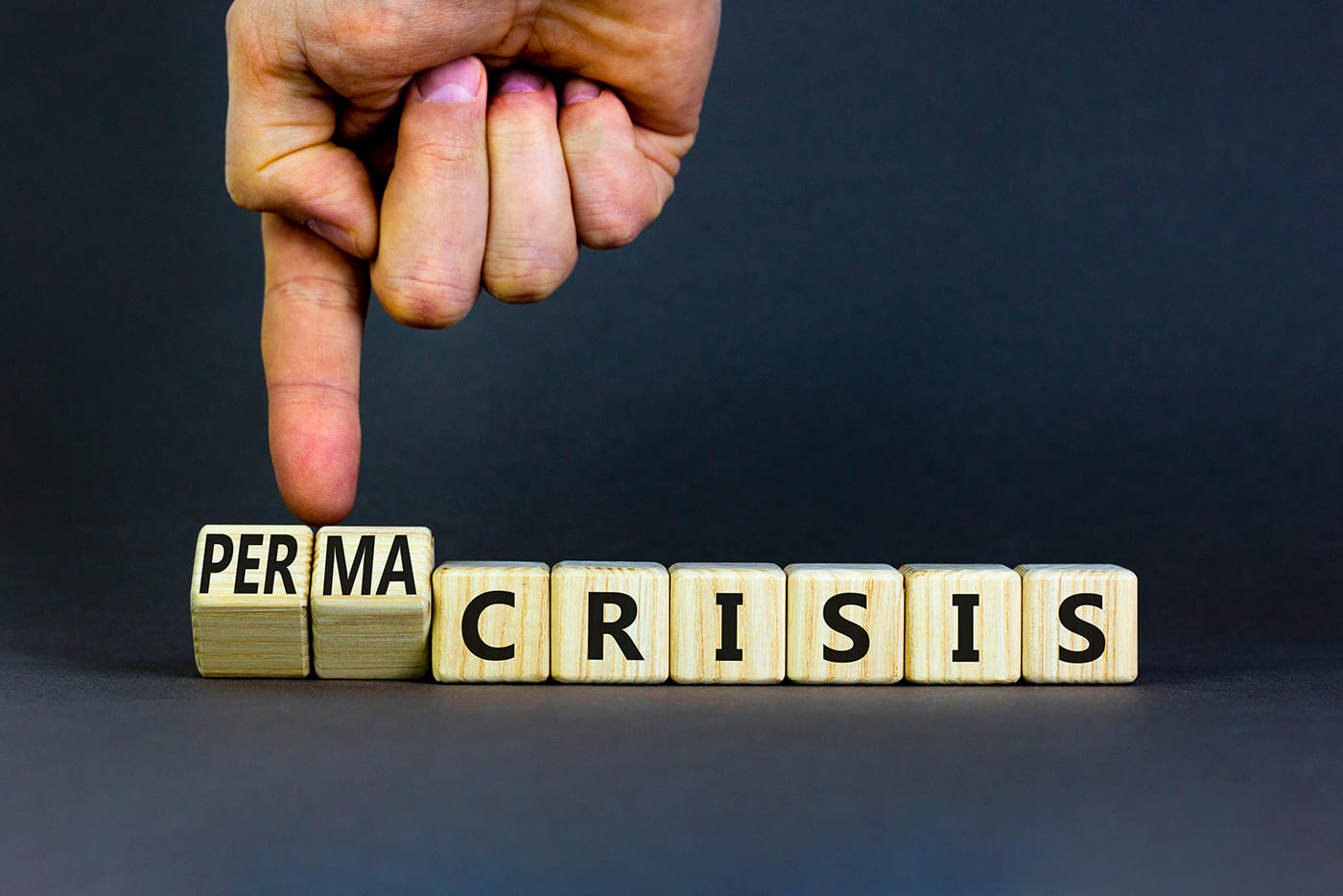Permacrisis: Resilience Emerges As Key Focus For Digital Transformation In 2023
15 February 2023
It’s clear that many industries are heading for turbulent times as we move further into 2023. Hangovers from the global Covid-19 pandemic are still affecting businesses as they struggle to overcome ongoing supply chain disruptions and worker shortages. Recessions are forecast in many parts of the world, and the war in Ukraine is causing unprecedented problems with energy and food production. It’s little surprise that “permacrisis” – meaning an extended period of instability and insecurity – has been picked as the 2022 word of the year by the Collins English Dictionary.

To counter this, the priority at many organizations, when it comes to digital transformation, is switching from traditional targets such as driving profits, revenue, or growth towards building resilient businesses. Resilient businesses are those that are strategically prepared to cope with disruption – whether it comes from pandemics, economic downturns, the ongoing skills shortage, or any other threats that may be on the horizon.
With this in mind, here’s an overview of some of the ways in which forward-looking businesses are focusing their digital transformation initiatives on overcoming the most pressing challenges of today. The threat of cyber-attacks, supply chain disruption, environmental and social upheaval, and workforce disruption will impact every business in a different way. In order to survive, it’s essential that businesses develop new ways of working that enable them to respond in a flexible and agile way.
Technological disruption
Technology disrupts business when new tools, methods, applications, or abilities are used to create new solutions to old problems. Great examples include video streaming enabling Netflix and similar businesses to wipe out the decades-old, multi-billion dollar video rental market almost overnight, AirB’n’B disrupting the travel and tourism industries, and ride-sharing apps like Uber upending the business model of taxi firms around the world.
In order to build resilience against these threats, businesses must ensure that they thoroughly understand the landscape of new and emerging technologies as they are relevant to their market. And don’t simply ignore them and leave them for their rivals and startup competitors to put to work against them. Some of the technologies that are proving to be highly disruptive across many industries right now include artificial intelligence (AI), the internet of things (IoT), virtual and augmented reality (VR/AR), and blockchain. If you're in business, understanding how all of these are threatening to disrupt your digital business models is essential and a great place to start when it comes to working out how to build resilience into your digital transformation strategy.
Prioritizing cybersecurity
In the past, cybersecurity was often treated as an afterthought. It was something to be built into systems and managed, probably by the IT department, after the core business functions had been established. With the world facing an explosion in the rate and severity of cyber-attacks, it’s obvious that this can no longer be the case.
Cybersecurity is now an issue that needs to be addressed at every level of an organization – from the boardroom, where it needs to be implemented as a core element of digital strategy, to the shop floor. Employees need to be educated on the importance of security skills – from spotting phishing and ransomware attacks to secure use of passwords and 2FA. These simple steps are essential when it comes to thwarting the large proportion of attack attempts that take the form of social engineering. The more devices your business has connected to its network, the more potential avenues of attack exist for an attacker wanting to access your system, so it’s essential to carry out regular audits of every piece of equipment in the business.
Securing supply chains
Since the Covid pandemic, the delicate nature of the global supply chains that keep businesses operating and able to supply their customers has been thrown into sharp relief. On top of that, it’s become apparent how drastically political disruption (think Brexit and the war in Ukraine) can sever vital links that keep businesses supplied and operational. Another threat is a global recession and its impact on businesses – a critical supplier going bankrupt or into administration can have severe knock-on effects for other organizations that rely on them for parts, products, or services.
Building resilience here might involve taking steps to move away from the “just-in-time” models that huge swathes of industry have adopted in order to streamline operations and minimize costs. This might mean holding more inventory, even if it incurs additional costs. It might even see some organizations rethinking policies of offshoring and outsourcing elements of their operations in order to ensure as much of their infrastructure is directly under their control as possible.
There are technological options to help with all of this – including AI and machine learning-powered solutions that manage inventory and analyze supply chains in order to unearth inefficiencies and identify weak links in the chain. Blockchain solutions are also emerging across many industries, aimed at creating more secure and resilient records of transactions involving multiple companies. Examining all of these opportunities is critical for organizations wanting to ensure that their digital transformation strategies are aligned with resilience.
Environmental resilience
Many companies and organizations understand the importance of moving towards sustainability targets such as net-zero carbon emissions and generally reducing the impact of their operations on the environment. This could take the form of reducing pollution or cutting down on the amount of energy and water used, as the world faces up to severe crises around the supply of both.
It's clear, therefore, that developing and hitting environmental goals should be a central part of any digital strategy transformation. This might include assessing the impact of initiatives such as cloud migration versus retaining on-premises infrastructure in the context of how it will affect your organization's emissions and energy usage. Technology, including AI, data analytics, and blockchain solutions, also provides new methods of gaining oversight into sustainability issues and assisting with decision-making. Bigger organizations are also starting to examine the effect their products and services have on their “downstream” environmental impact – that is, the impact created by their customers and users. Technology and digital transformation can be used to gain a holistic overview of all of these elements of environmental governance, and doing so should be a key part of any digital transformation strategy in 2023.
Overcoming the skills crisis
With the World Economic Forum predicting that half of all employees will need to be reskilled by 2025, many organizations are facing a future where they simply won’t have access to the skills needed to benefit from emerging technologies. Additionally, allowing essential functions such as cybersecurity to go overlooked simply because it’s hard to build the skilled workforce necessary to operationalize it will lead to other threats to resilience.
Digital strategies that can assist here include investing in innovation in the field of training and upskilling workforces. Rather than competing for dwindling pools of expensive external talent, identifying it within an existing workforce can prove more cost-effective and faster when it comes to plugging the key skills gaps needed to create resilient organizations. This could involve leveraging online learning resources and immersive technologies such as VR/AR to create on-the-job learning opportunities. Organizations can also partner with schools and higher education establishments to understand what programs are turning out the type of graduates they need and to provide feedback into curriculums to help ensure that students are graduating with skills that genuinely make them useful in the employment market.
Related Articles
Flying Taxis And Self-Driving Trucks Arrive In 2026: 6 Transport Trends To Watch
By now, “smart” versions exist of just about every home appliance, gadget and gizmos we can think of. However, manufacturers continue[...]
Technology in Action: My Key Takeaways on How AI and Quantum Are Accelerating Global Transformation
By now, “smart” versions exist of just about every home appliance, gadget and gizmos we can think of. However, manufacturers continue[...]
Sign up to Stay in Touch!
Bernard Marr is a world-renowned futurist, influencer and thought leader in the fields of business and technology, with a passion for using technology for the good of humanity.
He is a best-selling author of over 20 books, writes a regular column for Forbes and advises and coaches many of the world’s best-known organisations.
He has a combined following of 4 million people across his social media channels and newsletters and was ranked by LinkedIn as one of the top 5 business influencers in the world.
Bernard’s latest book is ‘Generative AI in Practice’.






Social Media